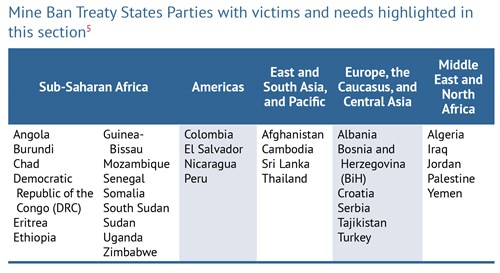Which States Parties are responsible for providing victim assistance and how well are they meeting needs?
In most States Parties to the Mine Ban Treaty some efforts to improve the quality and quantity of health and physical rehabilitation programs for survivors were undertaken. However, after a trend of large reductions in services available in recent years due to decreases in resources, in 2017–2018 many countries saw near-stagnation in the remaining core assistance services for mine/explosive remnants of war (ERW) victims. Services remained largely centralized, preventing many mine/ERW survivors who live in remote and rural areas from accessing those services. The needs remain great, including in the newest States Parties, Palestine and Sri Lanka.

States Parties to the Convention on Cluster Munitions have committed to improving assistance for cluster munition victims by 2020 as part of the Dubrovnik Action Plan, but continued declines in funding for community-based work of local organizations hampered access to rehabilitation and economic activities.
States Parties with cluster munition victims
|
Afghanistan |
|
Albania |
|
Bosnia and Herzegovina (BiH) |
|
Chad |
|
Colombia |
|
Croatia |
|
Guinea-Bissau |
|
Iraq |
|
Lao PDR |
|
Lebanon |
|
Montenegro |
|
Mozambique |
|
Sierra Leone |
|
Somalia |
Survivor organizations and networks active in countries and areas with cluster munition victims
|
States Parties |
Non-signatories and other areas |
|
Afghanistan |
Cambodia |
|
Albania |
Eritrea |
|
BiH |
Ethiopia |
|
Colombia |
Serbia |
|
Iraq |
Vietnam |
|
Mozambique |
Yemen |
|
Somalia |
Western Sahara |
|
Signatories |
|
|
DRC |
|
|
Uganda |
Note: other area indicated in italics.
(Last updated based on Landmine Monitor 2018 and Cluster Munition Monitor 2019)



